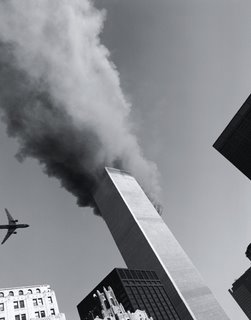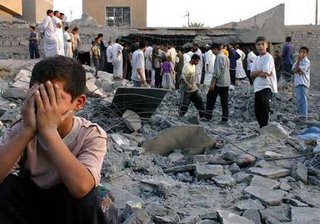 There probably were more articles, opinion pieces and editorials about the Sept. 11 terrorist attacks in New York and Washington over the past week than there were after the strikes five years ago. So much ink has been spilled, pixels been used and airtime taken on that issue that once again it feels like the world has stopped. CNN, the cable news network whose coverage days before the commemoration was nothing if not painfully trite, decided to present the events of 9/11 in real time, five years later, as if every half decade a victim of a car accident had to play the videotape of the event that nearly cost him his life. Experts, not-so-experts, pundits and politicians in office and not—all felt they needed to add their ten cents worth to the chorus. Failing to do so, it seemed, would be an unpardonable sin.
There probably were more articles, opinion pieces and editorials about the Sept. 11 terrorist attacks in New York and Washington over the past week than there were after the strikes five years ago. So much ink has been spilled, pixels been used and airtime taken on that issue that once again it feels like the world has stopped. CNN, the cable news network whose coverage days before the commemoration was nothing if not painfully trite, decided to present the events of 9/11 in real time, five years later, as if every half decade a victim of a car accident had to play the videotape of the event that nearly cost him his life. Experts, not-so-experts, pundits and politicians in office and not—all felt they needed to add their ten cents worth to the chorus. Failing to do so, it seemed, would be an unpardonable sin. At the Taipei Times where I work, during a time when Taiwanese President Chen Shui-bian (陳水扁) is facing a concerted effort (though hampered by torrential rains) to unseat him, the Opinions pages for the past three days have been about nothing but that, with pieces written by individuals as varied as CNN’s Nic Robertson to the caustic Christopher Hitchens. Being an editor there, I have had the chance (or misfortune, depending on how one sees it) to read, edit and read them all, over and over again.
What emerges is surprisingly—and in a way alarmingly—thin: the chief architects of the attacks, Osama bin Laden and Ayman al-Zawahiri, are still at large and continue to release video tapes threatening more pain on the US and its allies all over the world. This time around, whatever it is that is brewing is—if we are to believe what bin Laden’s right arm says in yesterday’s release—for the Gulf States and Israel. We’ve also learned that the US had the world’s opinion in its favor after 9/11, that most supported retaliation in Afghanistan but that there was unanimous opposition to the 2003 invasion of Iraq, which created many problems but solved precious little. All but the hardcore right-wingers agree in those opinion pieces that Iraq pushed the world back in its campaign against terrorism. Oh—a study now shows that the reduction in air traffic after the 9/11 attacks delayed the spreading of the flu virus, perhaps one of the few positive offshoots of the terrorist attacks.
As the “world” pauses to meditate on the attacks that occurred five years ago, in which nearly 3,000 people lost their lives, I wonder if we should not select a day in the year when we’d all stop and think about the much greater number of civilians who have been killed by the so-called coalition in Afghanistan, Iraq, Palestine and Lebanon, all of whom died from Western bombs launched in the name of a worldwide campaign to protect the vague though from our perspective narrowly-applied concepts of Freedom and Democracy. Should we not, say, make September 12 a remembrance day for all the innocent people who died as a result of the US-led retaliation (and then enlargement) to 9/11? Or are all these people expandable, not as worthy of our time as were the 3,000 or so who perished on that fateful day in September?
Like everybody else, yesterday plunged me back in time momentarily and I, too, relived the day by visualizing myself at 8:00am, 10:00am and so on. I vividly remember waiting at the bus station in Montreal, waiting to take the bus to Ottawa, where I would be taking my very first class in my War Studies graduate program at the Royal Military College of Canada. I still see that old New York-bound black lady as she approaches me and asks if I know the reason why the border with the US has been closed, at which point my cell phone rang and my father apprised me of the news from New York. The eerily-quiet Ottawa (and that says a lot) upon my arrival there is burned in my mind, as is the mood that filled the air in the meeting room at the National Defense building, where we held classes on Tuesdays. As the course that I was taking was, quite appropriately, an introduction to intelligence, I remember my professor—who for very valid reasons showed up a bit late and winded—saying that in light of the day’s events the perspective of the course would have to change a little.
This last aspect has renewed importance five years after the event, for this reorientation of the mind was exactly what I believed—and I still do—needed to be made if we were to avoid other horrors such as 9/11. We needed to alter how we dealt with the Middle East and change the behavior patterns that had given legitimacy to those who perpetrated the attacks.
Unfortunately, despite Donald Rumsfeld’s supposed new, light way of waging war in Afghanistan, or the “shock and awe” high-tech barrage against a country that had no WMD and which (it is now clear) had absolutely no ties to al-Qaeda, the lessons of 9/11 have not been learned. If they had, powerful states like the US and the UK would not have allowed Israel to wage war the way it did in Lebanon in July and August, nor would they have accepted the continued oppression against the Palestinians. Come to think of it, if those lessons had been learned, the US wouldn’t be bogged down in Iraq today after having created the conditions for a bloody civil war that truly risks inflaming an entire region. In fact, it looks as if the decision-makers in Washington made the conscious decision not to learn anything from 9/11 but to nevertheless use the attacks as a pretext to further their agenda for the Middle East, an agenda that as its first stop quite evidently had Baghdad. Many people believe the US invaded Iraq in response to 9/11. That simply isn’t the case. Even back in 2002, as war loomed, intelligence officials and political leaders in Washington knew fully well that Saddam Hussein had nothing to do with 9/11 or its mastermind. They also knew—and had reporting to support it—that Iraq had no existent WMD program to speak of.
All that 9/11 did was to give those people the pretext to go into Iraq, and even then they failed to convince the world of the worthiness of their cause. The UN never gave them the resolution they asked for, and the world over millions of people saw the war for what it was: an illegal war of aggression against a sovereign state.
There is no question that Iraq was a mistake and that the invasion took away precious resources and energy from the task in Afghanistan. As a result, five years after the terrorist attacks the Taliban insurgency is more intense today than it ever has been since the regime was ousted in late 2001, resulting to an insurgency that slowly is starting to take on the airs of Iraq. Canadian and British soldiers are being killed over there, waging a war that shouldn’t be theirs. NATO leaders this weekend called for more troops to be deployed in southern Afghanistan and will try again twice this week to convince members of the alliance to commit more.
Five long years of lessons not learned and savagery that can but further alienate and anger those in whose name (rightly or not) 9/11 was committed, half a decade for the greatest military power in history to fail miserably at apprehending the perpetrators of the attacks and in so doing created thousands of new adherents to a vengeful ideology.
And there you see them, the architects of that fiasco, solemn-looking in New York and behind the Pentagon, who have the gall to say, with a mock conviction that would be too painful to bear were it not so risible, that they will catch bin Laden. Or the “leader” of the so-called free world (though he certainly wasn’t elected by that free world) saying that there are still people out there who wish to do us harm, to attack the things we cherish most, our democracy and freedoms. Five years and those people are still lying—worse than that, five years and they are still allowed to lie through their teeth and look convincing. I wonder if there still are people out there who are truly convinced by those hollow words.
 The more I think about it, the more I believe we should have a Sept. 12 day for all the victims of Western aggression against the Middle East. Perhaps then, as we collectively stop and think about the men, women and children whose lives we foreshortened through cruise missiles and cluster bombs, we will be able to come up with the solutions to the problem. September 11, 2001, was horrific—there is no question about that. But we cannot continue to see this event in isolation, as if a wrong had been perpetrated without the inkling of a justification. We cannot stop to meditate, pray or write every September 11 and then continue on with our lives on Sept. 12 without a though for the vengeful plan that began to take shape on that day.
The more I think about it, the more I believe we should have a Sept. 12 day for all the victims of Western aggression against the Middle East. Perhaps then, as we collectively stop and think about the men, women and children whose lives we foreshortened through cruise missiles and cluster bombs, we will be able to come up with the solutions to the problem. September 11, 2001, was horrific—there is no question about that. But we cannot continue to see this event in isolation, as if a wrong had been perpetrated without the inkling of a justification. We cannot stop to meditate, pray or write every September 11 and then continue on with our lives on Sept. 12 without a though for the vengeful plan that began to take shape on that day.Let us all hope—for our sake and that of the millions who live in the Middle East—that five years from now we will have become a little wiser on this most important issue.

No comments:
Post a Comment